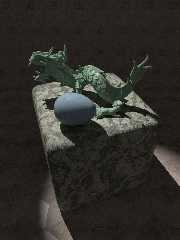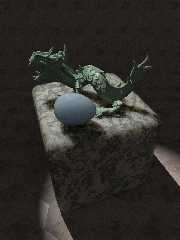 |
 |
|
 |
|
 |
|  |
|  |
|
 |
|
 |
|  |
|  |
|
 |
As a comparison, a render without any subsurface scattering.
--
Thomas
Post a reply to this message
Attachments:
Download 'sslt_test_uber_noss.png' (682 KB)
Preview of image 'sslt_test_uber_noss.png'

|
 |
|  |
|  |
|
 |
|
 |
|  |
|  |
|
 |
On 2017-04-28 06:59 AM (-4), Thomas de Groot wrote:
> As a comparison, a render without any subsurface scattering.
That definitely makes a huge difference with the dragon. It looks like
modeling clay, not jade. But there seems only a slight difference with
the floor, and the egg and cube look the same.
Post a reply to this message
|
 |
|  |
|  |
|
 |
|
 |
|  |
|  |
|
 |
On 29-4-2017 17:05, Cousin Ricky wrote:
> On 2017-04-28 06:59 AM (-4), Thomas de Groot wrote:
>> As a comparison, a render without any subsurface scattering.
>
> That definitely makes a huge difference with the dragon. It looks like
> modeling clay, not jade. But there seems only a slight difference with
> the floor, and the egg and cube look the same.
>
I think I need to explore more the translucency strength for each
object, increasing or decreasing the value. I am not yet done ;-)
--
Thomas
Post a reply to this message
|
 |
|  |
|  |
|
 |
|
 |
|  |
|  |
|
 |
On 30-4-2017 8:43, Thomas de Groot wrote:
> On 29-4-2017 17:05, Cousin Ricky wrote:
>> On 2017-04-28 06:59 AM (-4), Thomas de Groot wrote:
>>> As a comparison, a render without any subsurface scattering.
>>
>> That definitely makes a huge difference with the dragon. It looks like
>> modeling clay, not jade. But there seems only a slight difference with
>> the floor, and the egg and cube look the same.
>>
>
> I think I need to explore more the translucency strength for each
> object, increasing or decreasing the value. I am not yet done ;-)
>
In fact, the differences are more subtle. For the cube, compare the
shadows of dragon and egg: their edges show the stone's translucency. In
my next render I hope to show this better.
--
Thomas
Post a reply to this message
|
 |
|  |
|  |
|
 |
|
 |
|  |
|  |
|
 |
On 30-4-2017 9:48, Thomas de Groot wrote:
> In fact, the differences are more subtle. For the cube, compare the
> shadows of dragon and egg: their edges show the stone's translucency. In
> my next render I hope to show this better.
>
In this render:
- Dragon: no SSLT
- Floor: no SSLT
- Cube: SSLT with 5*translucency vector (was 2* in earlier example)
- Egg: SSLT with 3*translucency vector (was 2* in earlier example)
The cube is showing markedly more translucency in the shadows cast on
it. I see not much difference in the egg, although if I increase the
translucency exaggeratedly (*100 for instance) the effect becomes distorted.
Question: In the wiki about SSLT it is said: "The effect doesn't scale
with the object". Does this mean that SSLT works in the same way as a
scattering media where the amount of scattering has to be compensated
for the amount of media object's scale? It appears so to me at least
although this is not mentioned in the wiki.
--
Thomas
Post a reply to this message
Attachments:
Download 'sslt_test_uber.png' (679 KB)
Preview of image 'sslt_test_uber.png'

|
 |
|  |
|  |
|
 |
|
 |
|  |
|  |
|
 |
Le 17-04-30 à 07:05, Thomas de Groot a écrit :
> On 30-4-2017 9:48, Thomas de Groot wrote:
>> In fact, the differences are more subtle. For the cube, compare the
>> shadows of dragon and egg: their edges show the stone's translucency. In
>> my next render I hope to show this better.
>>
>
> In this render:
>
> - Dragon: no SSLT
> - Floor: no SSLT
> - Cube: SSLT with 5*translucency vector (was 2* in earlier example)
> - Egg: SSLT with 3*translucency vector (was 2* in earlier example)
>
> The cube is showing markedly more translucency in the shadows cast on
> it. I see not much difference in the egg, although if I increase the
> translucency exaggeratedly (*100 for instance) the effect becomes
> distorted.
>
> Question: In the wiki about SSLT it is said: "The effect doesn't scale
> with the object". Does this mean that SSLT works in the same way as a
> scattering media where the amount of scattering has to be compensated
> for the amount of media object's scale? It appears so to me at least
> although this is not mentioned in the wiki.
>
It does work similarly to medias, both emissive, absorbing and scattering.
So, if you scale your scene by 10 and want SSLT to look the same, then
you need to multiply your SSLT vector by 10. Alternately, you can
increase mm_per_unit by the same amount in the global_settings block.
Post a reply to this message
|
 |
|  |
|  |
|
 |
|
 |
|  |
|  |
|
 |
On 30-4-2017 18:30, Alain wrote:
> Le 17-04-30 à 07:05, Thomas de Groot a écrit :
>> On 30-4-2017 9:48, Thomas de Groot wrote:
>>> In fact, the differences are more subtle. For the cube, compare the
>>> shadows of dragon and egg: their edges show the stone's translucency. In
>>> my next render I hope to show this better.
>>>
>>
>> In this render:
>>
>> - Dragon: no SSLT
>> - Floor: no SSLT
>> - Cube: SSLT with 5*translucency vector (was 2* in earlier example)
>> - Egg: SSLT with 3*translucency vector (was 2* in earlier example)
>>
>> The cube is showing markedly more translucency in the shadows cast on
>> it. I see not much difference in the egg, although if I increase the
>> translucency exaggeratedly (*100 for instance) the effect becomes
>> distorted.
>>
>> Question: In the wiki about SSLT it is said: "The effect doesn't scale
>> with the object". Does this mean that SSLT works in the same way as a
>> scattering media where the amount of scattering has to be compensated
>> for the amount of media object's scale? It appears so to me at least
>> although this is not mentioned in the wiki.
>>
>
> It does work similarly to medias, both emissive, absorbing and scattering.
>
> So, if you scale your scene by 10 and want SSLT to look the same, then
> you need to multiply your SSLT vector by 10. Alternately, you can
> increase mm_per_unit by the same amount in the global_settings block.
>
OK. Only difference would be that with scattering media (for instance)
you have to /divide/ the scattering vector by the scale of the container
to get the same result, but I get the point indeed.
I am a bit wary about the mm_per_unit and prefer not to touch it too
much, especially if different objects have different scales.
--
Thomas
Post a reply to this message
|
 |
|  |
|  |
|
 |
|
 |
|  |
|  |
|
 |
On 5/1/2017 7:50 AM, Thomas de Groot wrote:
>
> I am a bit wary about the mm_per_unit and prefer not to touch it too
> much, especially if different objects have different scales.
Yes Clipka has put the fear of god into us. :-)
I suppose it depends what you intend by scaling the models.
--
Regards
Stephen
Post a reply to this message
|
 |
|  |
|  |
|
 |
|
 |
|  |
|  |
|
 |
On 1-5-2017 12:08, Stephen wrote:
> On 5/1/2017 7:50 AM, Thomas de Groot wrote:
>>
>> I am a bit wary about the mm_per_unit and prefer not to touch it too
>> much, especially if different objects have different scales.
>
> Yes Clipka has put the fear of god into us. :-)
> I suppose it depends what you intend by scaling the models.
>
Indeed, yes. Take my image as example, the dragon is scaled 0.01, the
egg 0.25, the cube is not scaled, and the floor 0.50. It seems best to
use a standard mm_per_unit and change translucency as needed.
--
Thomas
Post a reply to this message
|
 |
|  |
|  |
|
 |
|
 |
|  |
|  |
|
 |
On 5/1/2017 12:11 PM, Thomas de Groot wrote:
> On 1-5-2017 12:08, Stephen wrote:
>> On 5/1/2017 7:50 AM, Thomas de Groot wrote:
>>>
>>> I am a bit wary about the mm_per_unit and prefer not to touch it too
>>> much, especially if different objects have different scales.
>>
>> Yes Clipka has put the fear of god into us. :-)
>> I suppose it depends what you intend by scaling the models.
>>
>
> Indeed, yes. Take my image as example, the dragon is scaled 0.01, the
> egg 0.25, the cube is not scaled, and the floor 0.50. It seems best to
> use a standard mm_per_unit and change translucency as needed.
>
My understanding is that the mm_per_unit is the world/scene scale
And to add to the confusion (on my part at least) meshes can have an
internal scale and an external one. By internal scale I mean the scaling
you can change in PoseRay before exporting and external is how you
change it in PovRay.
In Blender when using the physics engine the scale should be 1.0. So to
scale a mesh. You need to edit it and scale it there. Otherwise you get
unexpected results.
So if the dragon is an ornament. I would scale it down in PoseRay. If it
is a statue scale it up in PoseRay. Keep the mm_per_unit as the default.
Having said that. I have not used SSLT since its RC3. :-(
So what do I know?
--
Regards
Stephen
Post a reply to this message
|
 |
|  |
|  |
|
 |
|
 |
|  |




![]()